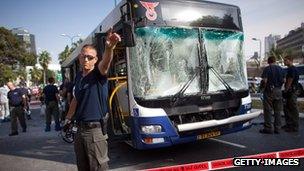Israel arrests Tel Aviv bus bomb suspects
- Published

Israel has arrested several Palestinians in the West Bank and an Israeli Arab, suspected of involvement in a bomb attack on a Tel Aviv bus.
The blast, which injured 29 people, came just hours before a ceasefire between Israel and Hamas on Wednesday.
It was the first such attack in Tel Aviv for more than six years.
Israel launched an offensive against Gaza, which it says was aimed at ending rocket fire from Gaza, with the killing of a Hamas military leader last week.
Israeli military spokeswoman Avital Leibovich said the Israeli bus bomb suspect was "an Arab-Israeli from Taybe and a member of Hamas".
Officials said that a number of Palestinians affiliated with Hamas and Islamic Jihad in the West Bank were also arrested, suspected of having recruited the man to carry out the bombing.
Police spokesman Micky Rosenfeld told the Associated Press news agency that a militant cell in the West bank had sent the man to place a bomb, connected to a mobile phone, on the bus.
After planting the device, the man called his Palestinian handlers, who detonated it remotely by calling the phone, he added.
In a statement, Israel's security agency Shin Bet said the arrests had happened "a few hours after the attack", AFP news agency reported.
Life resuming
People in Gaza and southern Israel are starting to return to normal life following the Egyptian-brokered ceasefire.
The UN's Office for the Co-ordination of Humanitarian Affairs (OCHA) says provisional figures from Gaza say that 158 people were killed there in the offensive. The figures showed 103 were civilians, including at least 30 children and 13 women. The OCHA is currently investigating the figures.
Six Israelis - two soldiers and four civilians - were killed in the conflict.
Under the truce deal, Israel has agreed to end all hostilities and targeted killings of militants, while all Palestinian factions will have to stop firing rockets into Israel and staging border attacks.
Israel must also begin talks about opening Gaza's border crossings and easing restrictions on the movement of people and goods.
After the ceasefire was announced, Gaza City was transformed, as people who had spent days sheltering from air strikes and shelling flooded into the streets, some of them firing weapons into the air in celebration, reports the BBC's Jon Donnison.
There were traffic jams on the streets, shops opened for business and queues formed at banks and cash machines. Cleaning and repair work was also being carried out on the many buildings damaged by air strikes.
The BBC's Ben Brown, in the southern Israeli town of Sderot, says the mood on that side of the border was more subdued; he says one television opinion poll suggests 70% of Israelis were against the ceasefire.
Both sides have said they will retaliate if the other breaks the truce.
"If Israel complies, we are compliant. If it does not comply, our hands are on the trigger," said Hamas leader, Khaled Meshaal, at a news conference in Cairo.
Israeli media quoted Defence Minister Ehud Barak as saying that the truce was not a formal agreement but a set of understandings.
It "could last nine days or nine weeks or more but if it doesn't hold, we know what to do and of course, we will consider the possibility of resuming our activity if there is any firing or provocations", he told Israeli public radio.
Israel's armed forces chief of staff, Lt Gen Benny Gantz, said the campaign had "hit Hamas hard" and had "accomplished its purposes and goals".
Israel says it targeted 1,500 "terror sites", including 30 senior militants, 980 underground rocket launchers and 140 smuggling tunnels, during its Operation Pillar of Defence.
It says 1,528 rockets (152 of which, it said, failed to launch properly) were fired against it from Gaza during the conflict, and that five rockets have been fired since the ceasefire.